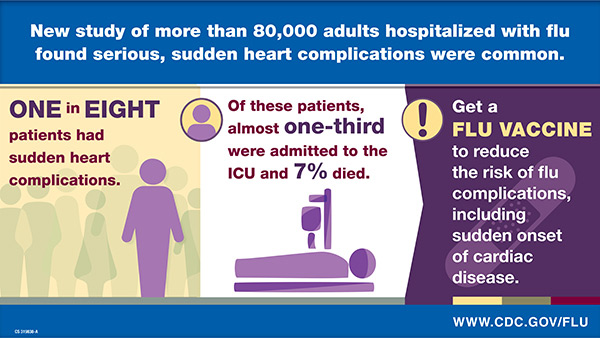
A study looking at more than 80,000 adult patients hospitalized with flu over eight seasons found that sudden, serious heart complications were common, occurring in 12% of patients, or 1 in 8.
Of these patients, one in three was admitted to the intensive care unit and 7% died.
University of Washington School of Medicine infectious diseases fellow Dr. Eric Chow was lead author on the paper describing the U.S. Centers for Disease Control and Prevention [CDC] study.
“Previous to our study, there had been suggestions between the link, but our study shows just how common it is,” Chow said.
The study looked at a range of sudden heart complications called “acute cardiac events” that resulted in the following:
- damage to the heart muscle,
- inflammation of the heart muscle,
- fluid or inflammation of the sac surrounding the heart, or
- weakening of the pumping function of the heart.
The most common acute cardiac events reported in the study were acute heart failure and acute ischemic heart disease.
Acute heart failure is the sudden inability of the heart to pump enough blood to meet the body’s demands, while acute ischemic heart disease is a term that describes heart problems caused by narrowed or blocked heart arteries.
Previous studies have looked at the relationship between influenza infection and heart attacks or heart failure, but few large, population-based studies have examined the frequency of acute cardiac events associated with laboratory confirmed influenza infection.
Therefore, this study contributes new and important findings to the scientific body of evidence on this topic.
The study also assessed risk factors for acute cardiac events. Older age, tobacco use, underlying cardiac disease, diabetes, and kidney disease were significantly associated with higher risk of acute heart failure and acute ischemic heart disease in adults hospitalized with laboratory-confirmed influenza infection.
Although vaccinated people had a lower risk of acute ischemic heart disease and acute heart failure, this study was not designed to assess flu vaccine effectiveness. However, other studies support the importance of influenza vaccines for people with underlying chronic conditions.
The study is subject to several limitations. There was likely under-detection of influenza cases, as flu testing was based on practitioner orders. Also, acute cardiac events were identified by ICD discharge codes and may be subject to misclassification bias.
CDC recommends that everyone 6 months and older get a flu vaccine this and every flu season. Flu vaccination is always considered important for people who are at high risk of developing serious flu complications, including people with heart disease.
Flu shots are approved for use in people with heart disease. People with heart disease should not receive the live attenuated influenza vaccine (LAIV, also known as the nasal spray flu vaccine).
However, any intramuscular flu shot (i.e., any inactivated or recombinant influenza vaccine) can be given.
The study is published Aug. 25 in the Annals of Internal Medicine, underscores the importance of getting a flu shot early.
“There are few respiratory viruses we have a vaccine for,” he said. “Our team motto is ‘Get a flu shot.’”
Chow previously worked as an epidemic intelligence service officer, or “disease detective,” for influenza at the Centers for Disease Control and Prevention.
Sources: UW Medicine and U.S. Centers for Disease Control and Prevention [CDC].


